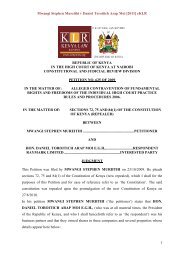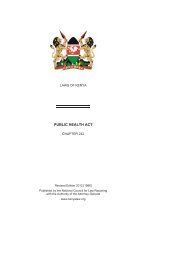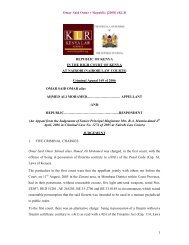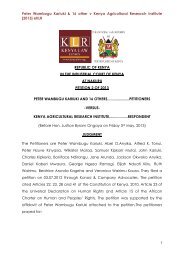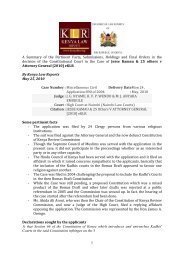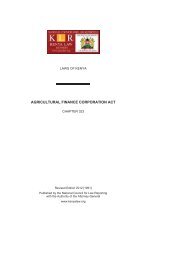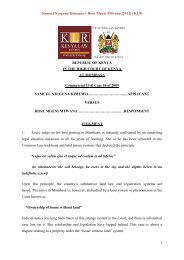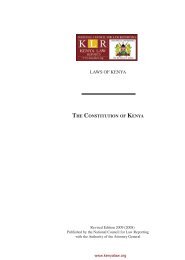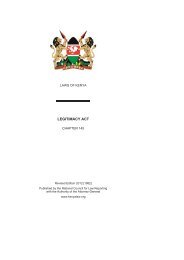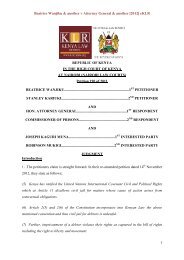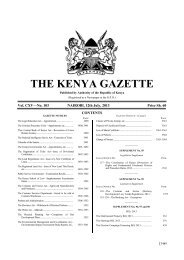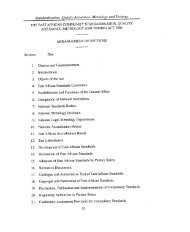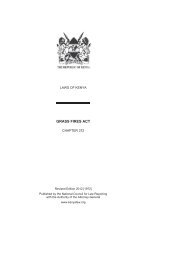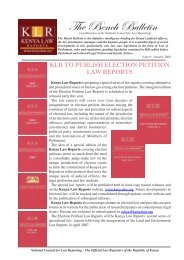Bench Bulletin - Issue 12 - Kenya Law Reports
Bench Bulletin - Issue 12 - Kenya Law Reports
Bench Bulletin - Issue 12 - Kenya Law Reports
You also want an ePaper? Increase the reach of your titles
YUMPU automatically turns print PDFs into web optimized ePapers that Google loves.
KENYA LAW REPORTS<br />
BENCH BULLETIN<br />
FEATURE CASE<br />
3. Moreover, nothing could take away the court’s inherent power to do justice. To allow the respondents’ preliminary<br />
objection would not inspire confidence and good sense in the administration of justice. Justice demanded that the<br />
Court should dismiss the objection.<br />
4. <strong>Kenya</strong>’s legal system is primarily intended or designed to give effective remedies and reliefs whenever the<br />
Constitution of <strong>Kenya</strong> is threatened with violation. As a part of reasonable, fair and just procedure to uphold the<br />
constitutional guarantees, the right to a fair trial entails a liberal and dynamic approach and not rigid and rudimental<br />
ways in order to ensure the grievances of an individual are addressed by the court no matter the name and the identity<br />
of the transgressor.<br />
5. When the law imposes on the Executive legally prescribed duties and responsibilities the performance of which<br />
depends upon the enhancing or handling of public interest, the political officers of the executive must act according<br />
to the laws of the land. If public officers including the President fail to act, and their failure harms the interests of the<br />
public and rights of individual citizens, their actions or omissions are subject to judicial review.<br />
6. The immunity from civil and criminal proceedings given to the President under section 14 of the Constitution cannot<br />
be absolute and is only meant to protect the interest of the wider citizens who have a stake in the presidency or who<br />
have elected the president to be the symbol of unity and protection of collective and individual rights of all citizens. The<br />
rationale for official immunity applies where only personal and private conduct by a president is at issue. It means that<br />
there shall be no case in which any public official can be granted any immunity from suit from his unofficial acts.<br />
7. The spirit and intention of the Constitution did not impose a blanket immunity that a sitting President cannot be<br />
sued for failing to observe the law or failing in his responsibility to do an act. A sitting President can be subjected to a<br />
process of a court when there is a clear violation of fundamental rights and environmental issues. If a sitting president<br />
pertinently and grossly contravenes a clear provision of the Constitution, he cannot be shielded from the intervention<br />
of the court by way of judicial review or declarations under section 84 of our Constitution.<br />
8. A party affected by the decision of a sitting president can rightly and legitimately seek the intervention of the High<br />
Court for redress or remedy by way of judicial review or by way of constitutional declaration. A constitutional office<br />
holder who is wrongly or illegally sacked by a sitting President can approach the High court by way of judicial review<br />
for redress.<br />
9. Judicial review proceedings are neither civil nor criminal proceedings and therefore cannot possibly fall within<br />
the ambit of section 14(2) of the Constitution and are therefore excluded from the protection afforded therein to the<br />
President against civil proceedings.<br />
10. In so far as the President appointed the tribunal and in so far as he was not a party to the Judicial Review<br />
proceedings, the Court was not in a position to say there was an omission that was directly committed by the president<br />
the case at hand.<br />
11. While the Chief Justice was immune from suit for matters directly related with exercise of his judicial functions,<br />
in making the representation to the President for the appointment of a Tribunal to investigate a judge under section<br />
62(5) of the Constitution, the Chief Justice does not exercise a judicial function but a constitutional and administrative<br />
function as the head of the Judiciary, for which he would be amenable to the supervisory jurisdiction of the High<br />
court and to judicial review orders. In the exercise of his constitutional mandate, the Chief Justice is amenable to the<br />
supervisory jurisdiction of the High Court.<br />
<strong>12</strong>. Counsel assisting the Tribunal was not a member of the Tribunal as he had not been gazetted as such. He was not<br />
an authority, public or quasi-judicial body to make a decision in the matter affecting the applicant. He did not investigate,<br />
make a report and/or make an order against the respondent. His role was to assist and he remained a servant of the<br />
tribunal in the performance of its mandate. He was therefore wrongly and improperly joined into the proceedings.<br />
13. A judge may only be removed from office in accordance with section 62 of the Constitution. Corruption or related<br />
complaints against a judge is a factor that there exists circumstances that would make him unable to perform his<br />
constitutional functions as a judge. A Judge can be removed from office by the President if the question of his removal<br />
has been referred to a tribunal and the tribunal has recommended to the President that the judge ought to be removed<br />
from office for inability or for misbehavior.<br />
14. Under section 61(2) of the Constitution, a Judge is appointed after the President has received the advice of the<br />
Judicial Service Commission (JSC) that a person is fit and competent to hold the office of a Judge. When a question<br />
arises as to the removal of a Judge, it is essential to seek and obtain the advice, guidance, contribution and direction of<br />
the same body that gave the advice to the President that it was okay to employ him in the first instance. Since the Chief<br />
Justice as the Chairman of the JSC had mandated the Ringera Committee to conduct investigations into the conduct of<br />
judicial officers, the JSC ought to have been the first branch that ought to have authorized the next step.<br />
15. The role of the JSC would be to determine whether the act complained about is of the nature and degree to<br />
qualify as misconduct sufficient to set in the processes that may lead to an adverse representation being made to the<br />
President. Such an examination would include seeing and hearing the complainant and the Judge separately for that<br />
would serve to inform and enhance a balanced and proper evaluation of the circumstances that has arisen which is<br />
likely to lead to removal of a Judge.<br />
<strong>Issue</strong> <strong>12</strong>: April-June 2010 33



